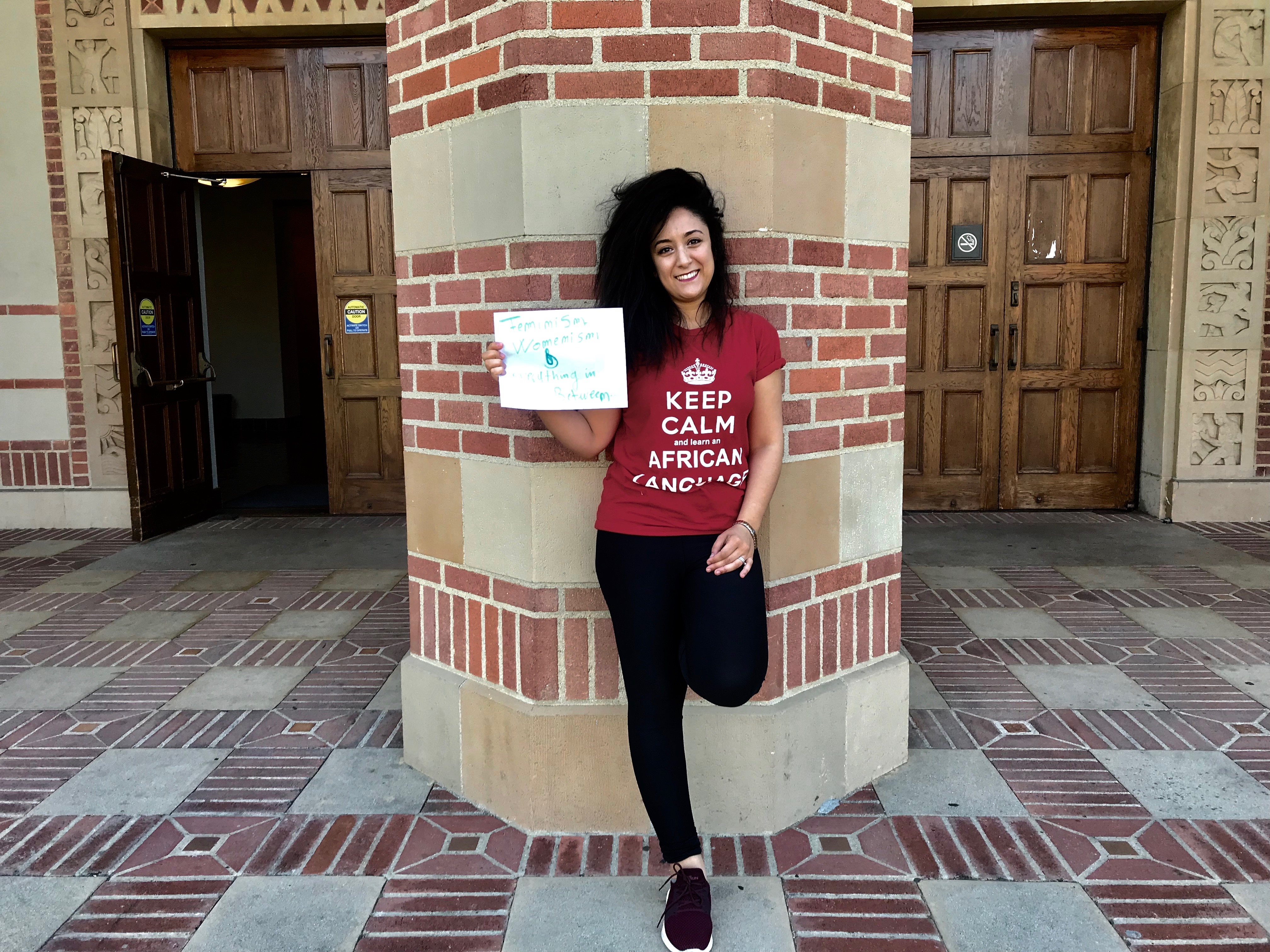Featured UCLA Feminist: Amira Hassnaoui

Photo by Lia Cohen
Amira Hassnaoui is a first-year PhD candidate in World Arts and Cultures/Dance. She is a leader both in academia and on the ground, where she has been an active community organizer, student leader, and activist.
Born in Tunisia, Amira grew up in a working-class home very much removed from the political sphere. She never talked politics with her family, and valued being a “good” citizen and playing by the rules, hoping to make her parents proud. Amira’s worldview shifted when, in 2011, her country underwent a political revolution, with thousands of Tunisians taking to the streets to demand change. On January 14, 2011, there was a huge demonstration that led to the ousting of then-president Zine el-Abidine Ben Ali. In efforts to protect Amira, her mother didn’t let her attend the protest, but she was ready to join the fight. Missing the historic demonstration only inspired her more to join the movement, and she soon began demonstrating regularly, joining together with local activists, journalists and organizers.
In one protest, Amira was with a friend when she was attacked by the police and tear-gassed before one of the cops called her a slut. The policeman was about to hit her when her friend took her away. This moment served as a turning point in Amira’s journey. This direct sexualization of her body and activism led her to question her own identity, traditions, institutions, and conception of politics and corruption. She was discovering her voice for the first time, realizing that she could use it as a tool for change. Since then she has continued to be vocal, from her scholarly research to her student leadership in town halls, on social media, and with academic and political administrations.
While Amira is passionate about women’s rights and elevating marginalized voices, she has struggled with the term feminism. Though more and more people are embracing intersectionality, she has felt that historically, Euro-American conceptions of feminism have excluded people of color and left certain people out. She finds herself identifying more as a womanist, but thinks the importance of equal rights goes far beyond the terms used.
“In my experience,” says Amira, “a lot of women in the Middle East and North Africa don’t embrace any of the terms, but are doing really important work that is invisibilized with certain feminist narratives that stigmatize domesticity and raising children.”
Amira’s mother, for example, was one of 12 children and raised Amira without even knowing what a feminist was, but in Amira’s eyes, was a “badass feminist” herself. Whether you call yourself a feminist, a womanist, or anything in between, Amira hopes to see a movement that moves beyond labels and is inclusive of POC, women, men, LGBTQ+ folks, and other identities.
Feminism has impacted Amira’s life in a variety of ways, from her academic journey to her personal relationships. She first began exploring feminism on a more theoretical level while obtaining her master’s degree in popular culture at Bowling Green State University in Ohio. Through her courses and interactions with professors and mentors like Montana Miller, she began to understand foundational feminist theories and learned to debunk and deconstruct them to find what she identified with. At the same time, she served as president of the graduate student senate and lobbied for change across the campus. She was also challenged to explore her own understanding of feminism with her husband, who comes from a family of feminists.
In her own scholarship, Amira finds herself walking the line between speaking the jargon of an academic institution based on eurocentric theoretical frameworks and embracing the language of the communities with whom she is working with in her own fieldwork.
“As an academic woman of color, I constantly wrestle with questions surrounding how to stay faithful to who I am without assimilating to the institution,” she says.
It’s a work in progress, but Amira is learning to find balance by taking care of her own needs while also recognizing her privilege in representing the people whose voices don’t traditionally make it into these spaces.
Moving forward, Amira hopes to see a feminist movement that is less exclusive in its focus on terms and labels. Instead, she envisions a united front of all types of people fighting for people of all identities. In her eyes, regardless of what people call themselves, they are welcome to join the fight if they are on board to do the work. As for the role of men, Amira believes it’s time for them to sit at the table and listen to marginalized voices, recognizing women’s rights as human issues and not as personalized attacks.
From growing up on the streets of Tunisia to becoming the first woman in her family to go into higher education, Amira is a trailblazer and continues to inspire everyone in her various communities.




